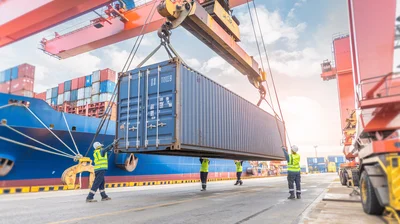
Shipyard workers in Louisiana have faced the risk of asbestos exposure for decades. Shipbuilding is one of Louisiana's oldest industries, with several major shipyards across the state. However, from the early 20th century until the late 1970s, these shipyards heavily relied on asbestos-containing materials for insulation, fireproofing, and other purposes. As a result, many shipyard workers were unknowingly exposed to asbestos fibers.
Asbestos exposure reveals its effects years or even decades later, often leading to serious and fatal illnesses. This page provides information on the mechanisms of asbestos exposure for Louisiana shipyard workers, the chief areas in a shipyard that can result in asbestos exposure, and legal options for Louisiana shipyard workers who are suffering from asbestos-related illnesses.
While asbestos use was prevalent, Louisiana shipyard workers at the highest risk of exposure included welders, pipefitters, electricians, insulators, and boilermakers. Each of these professions required close interaction with materials that once commonly contained asbestos.
For example, Louisiana shipyard welders and pipefitters often worked in confined spaces where asbestos insulation was used, leading to higher concentrations of airborne asbestos fibers.
Similarly, Louisiana shipyard electricians running wires through asbestos-insulated areas and insulation installers applying or removing asbestos products were directly in harm's way. Louisiana shipyard boilermakers, tasked with repairing and maintaining ships' boilers, also encountered asbestos in high-temperature environments, further elevating their exposure risk.
Furthermore, the use of asbestos in shipbuilding was not limited to these specific job roles. Asbestos was found throughout the shipbuilding process, from construction to repairs and maintenance. This means that any Louisiana shipyard worker could come into contact with asbestos fibers.
Select a location where you or a household member worked to see the jobsites in that location with known asbestos exposure.
Different operational zones within a shipyard exposed Louisiana workers to varying levels of asbestos. The highest-risk areas included boiler rooms, engine rooms, pump rooms, dry docks, propulsion shafts, and storage rooms. These areas often required frequent maintenance, repair, and insulation work, which meant that Louisiana shipyard workers in these areas were in constant contact with asbestos-containing materials.
In addition to these high-risk zones, Louisiana shipyard workers were exposed to asbestos in non-operational areas, such as break rooms, administrative offices, and storage facilities. Asbestos fibers could be easily carried from the work zones to these areas on workers' clothing or via ventilation systems.
Aside from the direct use of asbestos-containing materials in shipbuilding, other factors also contributed to workers' exposure. These included poor ventilation in confined spaces, lack of proper personal protective equipment (PPE), and inadequate training on the dangers of asbestos.
Furthermore, many Louisiana shipyards had a culture of downplaying or ignoring safety concerns in favor of productivity. This meant that workers were not properly informed about the presence of asbestos or provided with the necessary precautions to protect themselves from exposure.

Asbestos exposure has been linked to several diseases, including lung cancer, mesothelioma, and asbestosis. These illnesses can significantly impact a person's health and quality of life, often leading to medical bills, lost wages, and other financial burdens.
Unfortunately, many shipyard workers in Louisiana were unaware of the dangers of asbestos exposure and did not have proper protective measures. They were often exposed to high levels of asbestos dust while handling or working near products containing asbestos, increasing their risk of developing asbestos-related illnesses such as mesothelioma.
Despite regulations and safety measures implemented in recent decades, Louisiana shipyard workers still face potential asbestos exposure risks. Many older ships still operate and require maintenance and repairs, which may involve asbestos-containing materials.
Additionally, shipyard workers in Louisiana who were previously exposed to asbestos may still develop related health issues later in life, even if they are no longer working in the shipbuilding industry. It is important for current and former shipyard workers in Louisiana to be aware of these risks and to undergo regular medical screenings for asbestos-related diseases.
Louisiana shipyard workers seeking compensation for asbestos-related illnesses face numerous legal, medical, and administrative challenges. Hiring a qualified lawyer with experience handling asbestos-related claims can help ease the burden and improve the chances of a successful outcome. A knowledgeable attorney can assist in gathering evidence, evaluating medical records, and navigating complex legal processes to build a strong case for maximum compensation.
Furthermore, an experienced lawyer can safeguard workers' rights and ensure that insurance providers and other entities treat them fairly in the claims process. They provide invaluable support and guidance throughout the process and can advocate for their client's best interests, secure a fair settlement, or proceed to trial if required.
Feel free to reach out to us by filling out our form or giving us a call.
We will contact you to discuss your case, providing a free, no-obligation consultation.
You can choose to proceed with filing the lawsuit and await compensation.
Anyone who worked at, or lived with someone who worked at, these facilities could have been exposed to asbestos, which could have taken decades to result in cancer.
We Only Get Paid if We Collect for You

We provide free no-obligation asbestos exposure case review for Louisiana Shipyard Workers

We work on a contingency basis, meaning there are no fees unless we collect for you

We have experience winning claims against huge multi-national corporations

Fill the form below our team experts will contact you